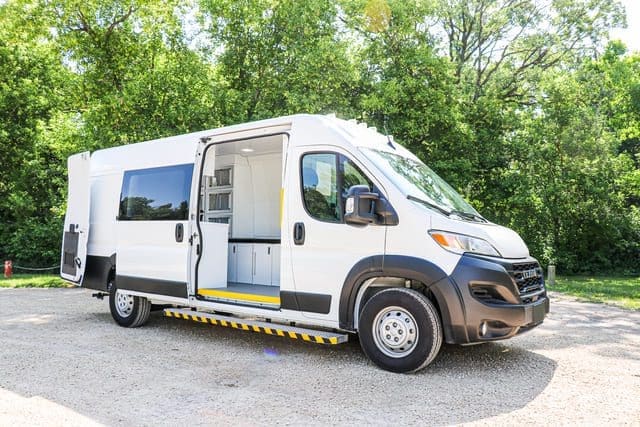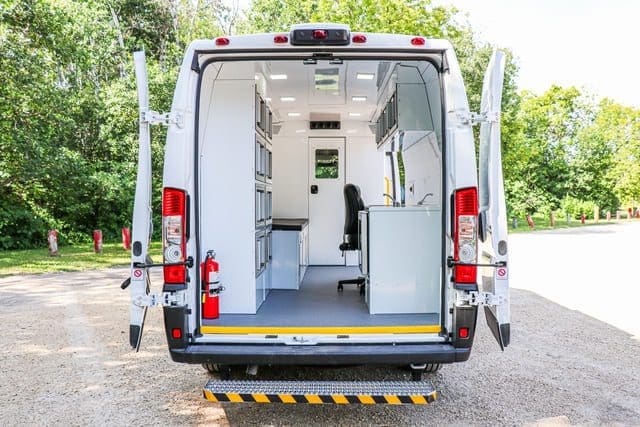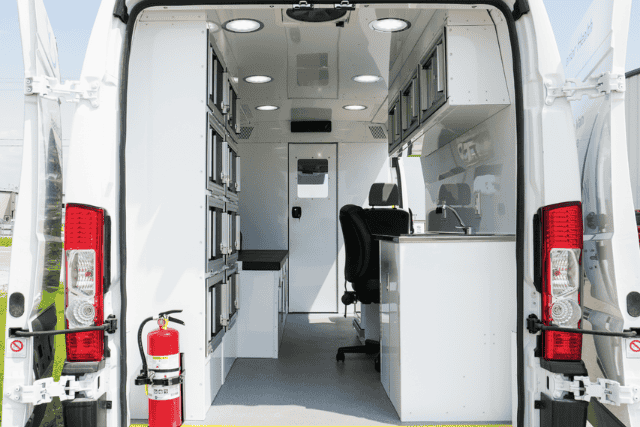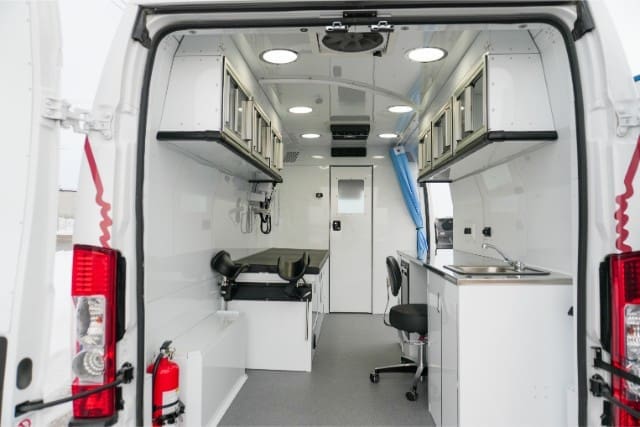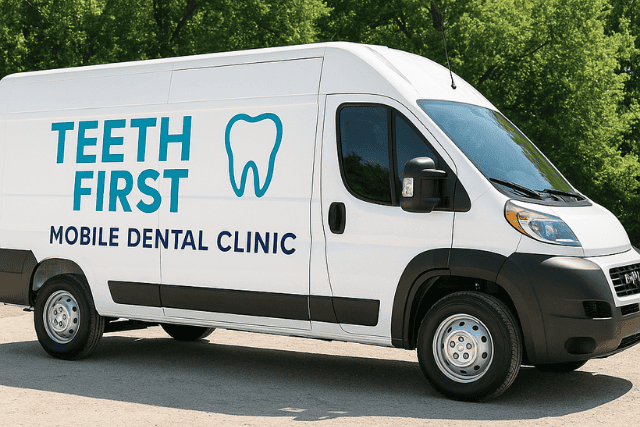Is your organization struggling to find funding for a mobile health clinic? Unexpected costs, a lack of trust from donors, and economic factors can all play a role in hindering you from getting the funds you need to get started. In addition, figuring out how to secure grants for mobile health clinics isn’t an easy task if you’ve never had to do it before.
At AVAN Mobility, we’ve been manufacturing mobile health clinics for over a decade. Having worked with such a diverse range of clients, we understand how difficult it can be for your organization to afford these vehicles. That’s why we’ve created a guide to give you more information on securing grants for mobile health clinics.
In this article, you’ll learn about:
- Some ways to start researching grant opportunities
- How to structure a grant proposal
- Why collaboration matters
- Supporting documentation and following up
Understanding grants for mobile health clinics
Grants are like gifts of money that organizations, governments, or foundations provide to support projects that align with their goals. For mobile health clinics, these grants can be essential in funding your organization’s efforts to provide healthcare where it’s needed the most.
Why are grants for mobile health clinics important?
Mobile health clinics go to areas where it’s not easy for people to reach a normal doctor’s office. Grants are so important because they allow organizations to make sure that no matter where people live, they can still get the medical help they require.
Mobile clinics also give check-ups, tests, counseling, and vaccinations, and teach about overall health.
Research and identify potential grant opportunities
Look for grants specifically targeted at healthcare, community development, and social welfare. As you’re searching online, make sure to include relevant search times like “grants for mobile health clinics.”
1. Online databases: Look up websites that list grants. Websites like GrantWatch and Grants.gov are great places to start.
2. Local foundations: Depending on where you’re located in the U.S., some grants may come from organizations right in your community. These are local foundations. They care about local causes, like your mobile health clinic. For example, the Michigan Health Endowment Fund is awarding a community health impact grant that ranges up to $150,000.
3. Healthcare associations: Groups that focus on healthcare might have grants for projects like yours. Explore associations like the American Public Health Association.
Understand grant eligibility and criteria
Carefully read the eligibility requirements and criteria for each grant opportunity. As you’re looking at eligibility requirements and criteria, make a checklist to keep track of these things for each grant you’re looking at.
Ensure that your project aligns with the goals and priorities of the grant provider. Highlight how your mobile health clinic addresses the healthcare needs of underserved communities.
Craft a compelling proposal for the grant
Your proposal should clearly explain why your mobile health clinic project is important and how it will benefit the community. Use simple language to describe your project’s goals, activities, and expected outcomes. Think of a proposal like telling a story about your mobile health clinic.
6 steps to structure your proposal for funding
Here is how your proposal should be structured in 6 steps:
1. Introduction: Begin with a clear and engaging opening. Explain who you are, what your clinic aims to do, and why it’s important.
2. The need: Describe the problem you’re addressing. Talk about the people who will benefit from your clinic.
3. Your plan: Lay out your mobile health clinic project plan. What will you do? How will you do it? Be specific and clear.
4. Budget: Break down the costs. How much will each part of the project need? Grants givers want to know their money will be used wisely.
5. Impact: Show the good your clinic will do. Will it serve a specific number of people? Will it improve health in a certain community?
6. Your team: Tell them about the people behind the project. Share the skills and dedication your team brings.
Here’s an example of how your proposal might start:
[Your company name] presents a funding proposal to establish a mobile health clinic. Its goal is to bring vital medical services to underserved U.S. communities. Our mobile clinic will address healthcare barriers and provide preventive care. It will also provide diagnostics, screenings, vaccinations, and health education.
With your support, we’ll end healthcare disparities in remote areas, providing access to thousands. Our project focuses on customization, medical equipment, staffing, community engagement, and operational costs. Collaborations with local institutions strengthen sustainability and reach.
With your help in funding this initiative, you contribute to accessible healthcare. Your help will make a tangible difference in underserved communities’ lives. Learn more at [your website].
Highlight the impact of the grant on your mobile health clinic

Share stories and examples of how mobile health clinics have positively impacted people’s lives. Use real-world scenarios to make your proposal relatable. Explain how your project will remove barriers to healthcare access and contribute to the well-being of the community.
Make your proposal for grant funding relatable. Include wording that will invoke emotion. There are 3 reasons why emotions are powerful tools when crafting grant funding proposals:
1. Engagement and connection: Emotional words help you connect with the reader on a personal level. When grant reviewers feel emotionally engaged, they’re more likely to pay attention and remember your proposal.
2. Highlighting significance: Emotional language can emphasize the importance of your project. It helps communicate the real-world impact and human stories behind your proposal, making it clear why your project matters and should be considered.
3. Creating a lasting impression: Proposals with emotional resonance leave a lasting impression. When grant reviewers recall the emotions your proposal produced, they’re more likely to advocate for your project during decision-making.
For example:
“Picture a child’s laughter as they receive a check-up that keeps them healthy. Imagine a parent’s relief as they get a check-up without worrying about the distance. Your generosity will power a mobile clinic where skilled caregivers will provide preventive care, screenings, and health education. It’s more than a project; it’s about giving families a brighter, healthier future.”
Emphasize collaboration in your grant application
If you work with partners, mention how your collaboration strengthens the project’s effectiveness. Highlight any alliances with local healthcare providers, community organizations, or government agencies.
Why collaboration matters
There are 3 key reasons why collaboration matters so much when trying to secure grants for mobile health clinics.
1. Strength in numbers: When you collaborate, you bring different strengths to the table, which can strengthen and make your proposal more convincing.
2. Diverse expertise: Everyone has something unique to offer. When you team up with medical experts, community leaders, or other organizations, you combine your skills for a bigger impact.
3. Showing commitment: Collaboration shows that you’re serious about your mobile health clinic project. It demonstrates that multiple parties are invested in making it happen.
How to emphasize collaboration
Showing that your organization can work with others reassures grant providers of the effective utilization of resources and increases the likelihood of grant approval.
There are a few ways to emphasize collaboration while you’re securing grants for mobile health clinics.
Partnerships: Highlight the organizations, individuals, or groups you’re working with. Explain how each partner contributes to the project’s success.
Roles and responsibilities: Clearly define what each collaborator brings to the table. Explain how their expertise and resources are essential to the project.
Letters of support: Get letters from your collaborators. These letters should talk about why they believe in your project and how they’re committed to its success.
Shared goals: Showcase how all collaborators share the same vision for the mobile health clinic. This unity reinforces the credibility of your proposal.
Try to think of collaboration as a recipe. Each ingredient adds a bit of flavor, and together, they create something delectable.
Prepare supporting documents in your grant application
Gather all the required documents, such as financial statements, organization details, and letters of support. Keep everything organized to make the application process smoother.
Why are supporting documents important?
Show, don’t just tell: Supporting documents back up the words in your proposal. They show funders that you’re serious and capable.
Demonstrate transparency: When you share financial statements and organization details, you’re letting funders see how you operate. Transparency builds trust.
Paint a full picture: Letters of support add color to your proposal. They reveal how others believe in your project, adding credibility.
Submission and follow-up
Submit your grant proposal by the deadline. Make sure to follow the submission instructions to the letter. After submission, many organizations allow you to track the progress of your grant submission. For example, if you apply for a grant through the Health Resources & Services Administration (HRSA), you can find out what stage your application is in the process through the tracking page.
If you have any questions related to your grant submission, consider writing an email to the organization. While it’s good to be patient, you also want to stay proactive. Keep an eye on your communication channels.
If you receive a request for more details, respond as soon as you can. It shows that you’re eager and engaged in the process.
Sometimes, grant providers might request additional information or clarification. Use this chance to clear things up and see it as an opportunity to present your project in the best light.
Stay persistent: If your proposal is not accepted, don’t be discouraged. Keep searching for other grant opportunities and continue refining your proposal based on feedback. According to a survey of U.S. mobile health clinics between 2007 and 2017, the rejection rate was around 28%, and the acceptance rate was 72%.
Key takeaways on securing grants for a mobile clinic
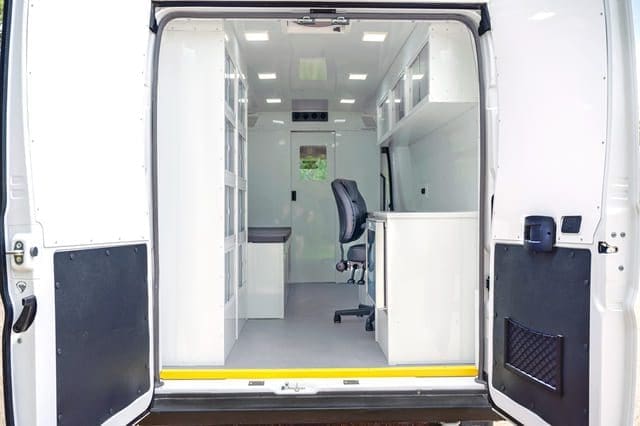
In this article, you learned some important guidelines for securing grants for mobile health clinics.
You learned that in applying for mobile medical van grants:
- The importance of being clear in your proposal
- Following the grant’s guidelines
- Using real-life examples to show why your mobile clinic matters
- The importance of collaboration
At AVAN Mobility, we know that securing grants for mobile health clinics requires effort, but the impact on your mission is worth it. With determination and a clear, relatable proposal, you’re well on your way to making healthcare accessible to all through your mobile health clinic initiatives.
If you’re interested in learning about some of the different mobile health clinic grants in the U.S., read our article on the Top 6 Ways to Find Mobile Health Grants.
To give you a better idea of the costs involved in the purchase of a mobile medical unit, take a look at this article: How Much Does a Mobile Medical Unit Cost in the U.S.?
If you have any questions, we’d love to hear from you. Click the button below to reach out to a mobility expert.
